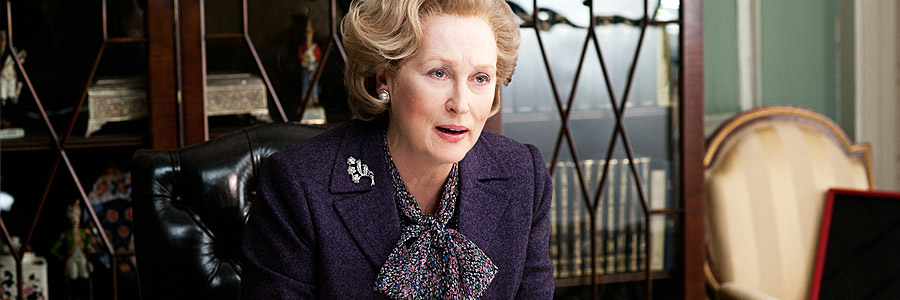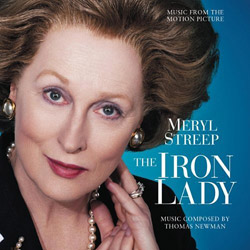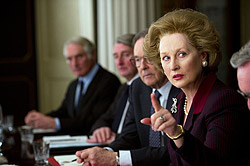
The Iron Lady

THE IRON LADY (CD)
Sony Classical
Release date:December 9th, 2011
Running time: 54:42 minutes
Composer: Thomas Newman
When I first heard of the release of The Iron Lady (2011), I instantly imagined pompous, good old British bold brass melodies and full-blown orchestral rejoice throughout (think Land of Hope and Glory and we’re on the same wavelength). You can imagine that I was pleasantly surprised however when I eventually heard the official soundtrack.
Although half right in my head – there is a definite British theme going on throughout – I was more than pleased to discover a fantastic combination of traditional orchestration with a subtle electronic soundscape.
Directed by Phyllida Lloyd, also known for the highest grossing musical film of all time, Mamma Mia! (2008) The Iron Lady focuses on the life of former and first ever female British Prime Minister Margaret Thatcher. It begins with an elderly Thatcher struggling with dementia and old age, reminiscing with her now dead husband, Denis Thatcher, through flashbacks of her rise to power and the personal and professional aspects of her life.

Struggling to distinguish the past from the present, we witness the personal price Margaret Thatcher has paid for power. We follow her through many historical events during her time in power, including her struggle to fit-in in a male dominated environment, her voice coaching and image change, rising unemployment, the Brixton riots and her near death experience at the 1984 Conservative Party Conference.
Thomas Newman, known for previous scores such as The Lost Boys (1987), The Shawshank Redemption (1994), American Beauty (1999) and The Green Mile (1999), has returned to what he does best – the soundtrack throughout is majestic, grand at times and emotionally captivating. The opening track, Soldiers of the Queen, is typically British – a traditional Brass band March with simple melodies and military style drum rolls, underlined by synthetic crowd cheers. The theme of the score is not so much a memorable melody, but the style in which it is played and the rhythmic expression created through the use of the chosen instrumentation.
It is established in the short second track MT, only 49 seconds in length, which is a great contrast to the opening track. Sweeping synthetic strings and pads and a subtle acoustic guitar that establish the rhythm accompany short woodwind stabs of melody. This is carried on throughout the third track Grocer’s Daughter, a waltz style piece with the theme being developed further with the use of pizzicato strings, staccato phrases and gentle synth accompaniment, along with a ‘ticking clock’ effect to establish the rhythm. The use of synthesiser in Grand Hotel, only 46 seconds in length, has no melody or musical development as such; it is designed to purely create tension.
- 1. Soldiers Of The Queen
- 2. MT
- 3. Grocer’s Daughter
- 4. Grand Hotel
- 5. Swing Parliament
- 6. Eyelash
- 7. Shall We Dance?
- 8. Denis
- 9. The Great In Great Britain
- 10. Airey Neave
- 11. Discord And Harmony
- 12. The Twins
- 13. Nation Of Shopkeepers
- 14. Fiscal Responsibility
- 15. Crisis Of Confidence
- 16. Community Charge
- 17. Casta Diva (From “Norma”)
- 18. The Difficult Decisions
- 19. Exclusion Zone
- 20. Statecraft
- 21. Steady The Buffs
- 22. Prelude No. 1 In C Major, BWV 846
Swing Parliament begins in true orchestral style, with a fabulous pianissimo string melody which crescendos into a combination of traditional orchestral instrumentation combined with synthesiser and ambient noise, culminating in the return of the main theme held by the strings and woodwind and accompanied by brash percussion and cymbal crashes. Eyelash is a simplistic yet beautiful piano melody with little accompaniment other than a low sweeping pad and percussion. This track in particular reminds me of Any Other Name from the American Beauty soundtrack, and if the listener didn’t know already that this was a Thomas Newman score they certainly would have an idea by now.
The Great in Great Britain brings us back to the glory of traditional orchestral British music and is reminiscent of something you would hear at the Proms. It is grand, lively and expressive, as is Discord and Harmony. Crisis of Confidence brings us back to the original rhythmic theme, and creates a feeling of tension and urgency through dissonance, heavy percussion and effective use of synthesiser.
Community Charge takes the score in a new direction. The rhythmic theme can still be easily identified, however the use of electric guitar riffs and drum kit creates the feeling you’re at the introduction of a rock concert, waiting for the band to appear from the darkness. Intertwining percussion motifs combine with an elegant high piano melody. I must say that this is one of my favourite pieces from the score. Statecraft is much the reprisal of Grocer’s Daughter, and takes us back to Thatcher’s roots.

Steady the Buffs is a fantastic piece, which again combines synthetic and traditional instrumentation, which leads into a rapid high violin phrase. A complete contrast is then created with the combination of low strings and choir with a following subtle high piano melody. The emotions created in this particular piece support the scene to which it is set tremendously. The score also uses traditional tracks such as Shall We Dance? [From “The King & I”], Casta Diva [From “Norma”] and Bach’s Prelude No. 1 in C major, BWV 846 to underpin certain scenes in the film.
Thomas Newman’s ability to effectively combine the use of traditional instrumentation with more modern synthetic material is fantastic. Newman has managed to sustain the feel of the 1980’s and give it a modern twist. I believe I have just discovered my second favourite composer. Why he has not yet received an Oscar after 10 nominations is beyond me. At times I was convinced that I was listening to excerpts from the works of Danny Elfman. In my opinion, it is a very strong, must buy album, which should surely win him an award he deserves.

Phil Blanckley
Phil is a 27-year-old classically trained musician from Sheffield with qualifications in Popular Music, Classical Music and a BA (Hons) in Creative Music Technology and Sound Recording. He likes nothing better than locking himself in the studio and composing music of all genres.
Phil became interested in composing after learning how to play the Cello and Clarinet at a young age, and has never looked back since. His favourite composer is Danny Elfman, whose unconventional harmonies and rhythms in scores such as Edward Scissorhands still manage to bring a tear or two to his eye.
You can find him on Twitter @PhilBlanckley.
© 2022 STATIC MASS EMPORIUM . All Rights Reserved. Powered by METATEMPUS | creative.timeless.personal. | DISCLAIMER, TERMS & CONDITIONS
HOME | ABOUT | CONTACT | TWITTER | GOOGLE+ | FACEBOOK | TUMBLR | YOUTUBE | RSS FEED
CINEMA REVIEWS | BLU-RAY & DVD | THE EMPORIUM | DOCUMENTARIES | WORLD CINEMA | CULT MOVIES | INDIAN CINEMA | EARLY CINEMA
MOVIE CLASSICS | DECONSTRUCTING CINEMA | SOUNDTRACKS | INTERVIEWS | THE DIRECTOR’S CHAIR | JAPANESE CINEMA





